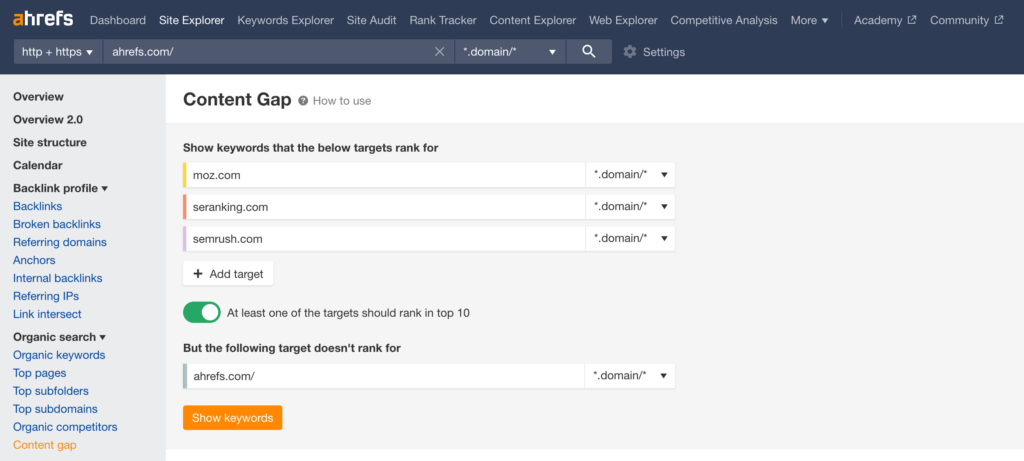
In the ever-evolving world of search engine optimization (SEO), staying ahead of the competition is essential. That’s why the importance of competitor analysis is obvious and undeniable today. One powerful strategy that can give you an edge is competitor keyword research. By researching the keywords your competitors are targeting, you gain valuable insights into their SEO tactics and open up opportunities to improve your own site’s visibility.
Identifying and analyzing the keywords your competitors use to rank on search engine result pages (SERPs) helps you understand their keyword strategies so you can improve your own approach and improve your chances of climbing higher in search rankings.
To conduct a comprehensive keyword competitor analysis, you need the right tools and a well-defined process. In the following sections, we’ll walk through all the steps, from choosing the right research tools for keyword analysis to track competitor rankings. By the end of this article, you will be armed with the knowledge to improve your SEO efforts and outperform your competitors.
What is Competitor Keyword Analysis?
A competitor keyword analysis is a process of identifying and evaluating the keywords that your competitors are targeting in their SEO strategies. It allows you to gain valuable insights into their keyword choices, content optimization techniques, and overall SEO tactics. By understanding what keywords your competitors are ranking for, you can refine your own keyword targeting, optimize your content, and improve your search engine rankings. The idea is similar to when you analyze competitor backlinks.
Example Scenario
Imagine you run an e-commerce website selling organic skincare products. One of your direct competitors is a well-known beauty brand that specializes in natural skincare. To gain a competitive edge, you decide to conduct a thorough competitors’ keywords analysis.
Upon analyzing their website and content, you discover that they are targeting keywords such as “organic skincare,” “natural beauty products,” and “vegan skincare.” These focus keywords align perfectly with your own product offerings and target audience. By examining their on-page optimization, you notice they strategically incorporate these keywords in their meta tags, headings, and product descriptions.
Using a keyword research tool, you evaluate the search volume and competition level of these keywords. You find that they have a significant search volume, indicating a high demand for these products. However, the competition is also intense, with several other skincare brands vying for top rankings.
While analyzing your competitor’s strategy, you identify a keyword gap. They are actively targeting the keyword “cruelty-free skincare,” which has a decent search volume and lower competition. Recognizing this opportunity, you decide to optimize your content and create a product category specifically targeting this keyword.
Furthermore, you examine their content creation and blogging efforts. You notice that they frequently publish articles on topics like “how to achieve a natural glow” or “skincare routines for sensitive skin.” By analyzing the engagement and social shares of these articles, you gain insights into the different types of keywords you can use and types of content that resonate with your shared target audience.
Armed with this information, you refine your own SEO strategy. You optimize your product pages and blog articles using relevant keywords, including the ones you uncovered during your competitor analysis. Additionally, you focus on creating valuable content that addresses common skincare concerns and provides informative guides.
Over time, you track the performance of your optimized pages and content, comparing them to your competitor ranking. By consistently monitoring their keyword targeting and any changes they make, you adapt your strategy accordingly. If you notice they start targeting a new keyword, you evaluate its relevance to your business and consider incorporating it into your own SEO efforts.
By conducting a comprehensive SEO competitor keyword analysis and leveraging the insights gained, you position your organic skincare website to attract a wider audience, outrank your competitors, and ultimately drive more organic traffic and conversions.
In this way, competitor keywords analysis plays a vital role in understanding your competitors’ SEO strategies, uncovering keyword opportunities, and refining your own SEO approach. By continuously monitoring and analyzing your competitors’ keyword targeting and optimization tactics, you can stay ahead of the keyword competition and maximize your organic search visibility. And it is more efficient to entrust it to a professional SEO company whose experience will allow you to avoid common mistakes, and, as a result, save time and money.

Why Competitor Keyword Research Matters
Competitor keyword research is a critical aspect of SEO that can yield numerous benefits for your website’s visibility and overall success. Let’s explore the key reasons why the research of competitor keywords matters:
- • Uncover New Keyword Opportunities: By analyzing your competitors’ keywords, you can identify new keyword opportunities that you may not have considered. Discovering untapped keywords allows you to expand your reach and attract a broader audience to your website.
- • Gain Insights into Competitors’ SEO Tactics: When you analyze competitor keywords it provides valuable insights into your competitors’ SEO strategies. By understanding the keywords they are targeting, the content they create, and the optimization techniques they employ, you can gain inspiration and benchmark your own efforts against theirs.
- • Enhance Your Keyword Selection: Analyzing competitors’ keywords helps you refine and optimize your own keyword selection. By evaluating which keywords used by competitors are ranking well, you can identify high-value keywords to target in your own SEO campaigns.
- • Stay Relevant in Your Industry: Keeping an eye on your competitors’ keyword strategies allows you to stay up-to-date with the latest trends in your industry. By aligning your keyword targeting with industry trends, you can ensure that your website remains relevant and competitive.
- • Improve Content Optimization: Analyzing competitors’ keywords can help you improve the optimization of your content. By understanding how your competitors incorporate keywords into their content, you can optimize your own website’s content to better align with search engine algorithms and user search intent.
- • Refine Your SEO Strategy: If you analyze competitors website keywords it enables you to refine and fine-tune your overall SEO strategy. By leveraging the insights gained from analyzing the keywords of competitors, you can make informed decisions about your keyword targeting, content creation, and optimization techniques.
- • Identify Content Gaps: By analyzing competitors keywords you can identify content gaps on your website. This allows you to create new, valuable content which will be useful for your visitors and will be able to attract additional organic traffic.
- • Stay Ahead of the Competition: Competitors’ keyword research helps you stay one step ahead of your competition. By continuously monitoring and analyzing your competitors’ keyword strategies, you can adapt and adjust your own SEO efforts to outperform them in SERP competitors ranking.
Thoroughly researching competitors’ keywords provides valuable insights that inform your own SEO strategy. By implementing a comprehensive keywords competitors analysis strategy, you can step up your SEO efforts, improve your keyword targeting, and ultimately increase your visibility in organic search. In the next section, we’ll take a detailed look at the specific steps for conducting competitor keyword research for SEO.
How to Analyze Competitors’ Keywords
Analyzing competitors’ keywords is a crucial step in understanding their SEO strategies and uncovering valuable insights for your own keyword targeting. By following a systematic approach, you can effectively analyze your competitors’ keywords and leverage the information to enhance your SEO efforts. Here are the steps involved:
Step 1. Choose Keyword Competitor Research Tools
Start by selecting a reliable keyword competitor analysis tool to aid in your analysis. Popular tools include Ahrefs, Semrush, and Moz. These platforms provide valuable data on search volume, keyword difficulty, and competitor analysis. By utilizing these tools, you can gain comprehensive insights into your competitors’ keyword strategies and identify opportunities for improvement.
Example: By using Ahrefs you can access competitor analysis features that reveal the organic keywords your competitors are ranking for, their search volumes, and the traffic they generate. This information enables you to identify gaps in your own keyword targeting and refine your SEO approach accordingly.
Step 2. Find Keyword Competitors
Identify your main keyword competitors within your industry. These are businesses or websites that target similar keywords and share a similar target audience. Begin by conducting a search for your primary keywords on search engines like Google. Look for websites that consistently appear in the top search results for these keywords. Also, the tools listed above will give you a list of your top competitors based on the keywords you use. By re-checking the list manually, you can choose the most relevant and suitable competitors from them.
Example: If you have an e-commerce website selling fitness equipment, search for keywords such as “home gym equipment” or “exercise machines.” The websites consistently appearing in the top search results for these keywords are likely your keyword competitors.
Step 3. Check Competitor Website Keywords
Once you have identified your keyword competitors, analyze their websites to uncover the focus keywords they are targeting. Use the tools to check each individual competitor’s website and see their top traffic pages and keywords. Pay attention to such types of pages as like their homepage, service pages, product pages, product categories, and blog posts. Also check elements like meta tags and headers for these pages, what queries they use there, and how they implement them. Look for patterns and trends in their keyword usage, as well as the overall optimization of their website for search engines.
Example: If one of your competitors is a travel blog targeting keywords like “solo travel tips,” “budget travel destinations,” and “travel photography,” carefully examine their blog posts to identify the keywords they prioritize. Note how they incorporate these keywords within their content to enhance their search engine visibility.

Step 4. Do Keyword Gap Analysis
Perform a keyword gap analysis to identify keywords that your competitors are ranking for, but you are not targeting. This analysis helps you discover untapped opportunities to expand your keyword list and attract more organic traffic.
Using keyword research tools from Step 1 which have a special Keyword Gap Analysis feature, compare the keywords you have identified with the keywords you are currently targeting. Look for keywords that your competitors rank well for, but you may need to look at them. These are potential keyword gaps that you can capitalize on.
Example: If you run a blog about healthy cooking and one of your competitors consistently ranks for keywords like “vegan recipes for weight loss” or “gluten-free meal ideas,” it indicates a keyword gap. You can create targeted content around these keywords to attract users searching for those specific terms.
Step 5. Analyze Competitors’ Keywords and Ranking
Examine the keywords your competitors are targeting and analyze their search engine rankings. Look for patterns and trends in their keyword selection, and evaluate how their rankings fluctuate over time. This analysis provides insights into the effectiveness of their keyword strategies.
Example: Let’s say you run an online pet supply store and identify a competitor that consistently ranks highly for keywords like “organic dog food,” “pet grooming supplies,” and “cat toys.” By analyzing their keyword strategy and tracking their rankings over time, you can gain insights into their effective keyword selection and identify opportunities to improve your own rankings. You may discover that they have optimized their content and meta tags for these keywords, allowing you to refine your own SEO efforts and target similar keywords to attract organic traffic to your website.
Step 6. Assess Keyword Relevance
Based on your analysis of competitors’ keywords, select the ones that are relevant to your business and align with your content strategy. Focus on keywords that have a decent search volume and manageable competition level.
Consider the intent behind the keywords and how they relate to your products, services, or content. Choose keywords that accurately reflect what you offer and are likely to attract your target audience. It’s important to strike a balance between keywords with high search volume and those that are specific to your niche.
Example: If you have an online store selling handmade jewelry, and one of your competitors is ranking well for the keyword “custom silver rings,” you can consider incorporating a similar keyword like “handcrafted silver rings” into your SEO strategy. This way, you can capture the attention of users searching for personalized silver rings.
Step 7. Refine Your Keyword Strategy
Once you have identified the keywords you want to target, optimize your website content accordingly. Incorporate these keywords strategically into your meta tags, headings, URLs, and throughout your page content.
Ensure that your content remains natural and engaging to readers while including the targeted keywords. Avoid keyword stuffing, which is the excessive and unnatural use of keywords, as it can negatively impact your search engine rankings.
Example: If your blog focuses on healthy eating and you’ve selected the keyword “nutritious smoothie recipes,” you can optimize your blog post by including this keyword in the title, meta description, and throughout the article. However, remember to maintain a conversational tone and provide valuable information that is helpful to your readers.
Step 8. Track Competitors’ Keywords Constantly
Competitor website keyword analysis is an ongoing process, and it’s essential to continually monitor your competitors’ keyword strategies. Stay up-to-date with any changes or additions they make to their keyword targeting.
Use competitor keyword tracking tools or features within competitor keyword analysis tools to keep tabs on your competitors’ keyword rankings. By staying informed, you can adapt your own keyword strategy, identify emerging trends, and seize new opportunities.
Example: If you notice that one of your competitors starts targeting a new keyword related to a trending topic in your industry, you can evaluate its relevance and potential impact on your own SEO efforts. If it aligns with your content and target audience, you may consider incorporating that keyword into your strategy to stay competitive.
By following these steps and conducting a thorough analysis of your competitor’s keywords, you can gain valuable insights to enhance your own SEO strategy. Remember that keyword SEO competitor analysis is an ongoing process, and staying updated with your competitors’ keyword tactics will help you remain competitive in the ever-evolving digital landscape.
Final Thoughts
Competitor keyword analysis is a crucial aspect of SEO that allows you to gain valuable insights into your competitors’ strategies and identify opportunities to improve your own search engine rankings. By thoroughly analyzing your competitors’ keywords, you can uncover untapped keyword opportunities, refine your content strategy, and stay ahead in the competitive digital space.
Throughout this guide, we have explored the importance of SEO competitor keywords research and provided a step-by-step process to effectively analyze your competitors’ keywords. By following these steps, you can gather actionable insights and make informed decisions to enhance your SEO efforts.
To further assist you in your competitor analysis journey, Mellow Promo offers comprehensive SEO competitor analysis services. We are a leading provider of digital marketing solutions with a strong focus on SEO. Our team of experts utilizes advanced tools and techniques to help businesses understand their competition and develop effective strategies.
With Mellow Promo’s SEO competitor analysis services, you can expect in-depth research and analysis of your competitors’ keyword strategies. Our experts will identify your main keyword competitors, analyze their website content, uncover keyword gaps, and provide valuable recommendations to improve your SEO performance.
Moreover, Mellow Promo offers regular monitoring and tracking of competitors’ keywords, ensuring that you stay up-to-date with any changes in their keyword targeting and optimization tactics. This allows you to adapt your strategy accordingly and maintain a competitive edge.
Consider leveraging the expertise of Mellow Promo’s SEO competitor analysis services to gain a comprehensive understanding of your competitors’ keyword tactics and enhance your SEO strategy.





